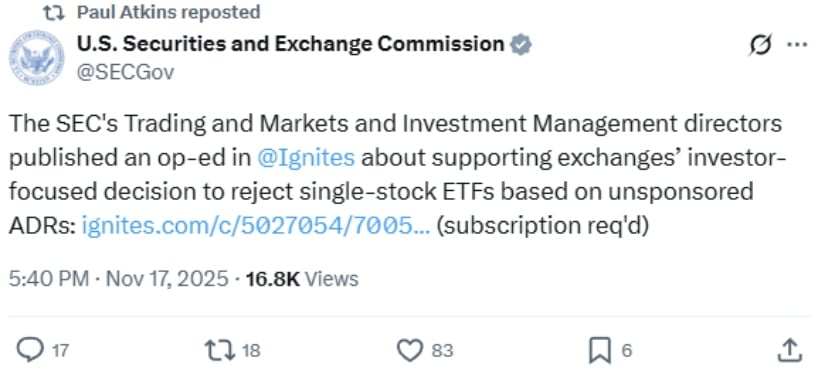The Securities and Exchange Commission is entering what analysts call its most important 12 months under Chairman Paul Atkins, after the longest government shutdown in recent memory recently ended.
Investment bank TD Cowen described this deadline as crucial to the implementation of Atkins’ deregulation agenda, particularly with regard to the regulation of cryptocurrencies.
The shutdown significantly limited SEC’s operations, reducing staff of more than 4,200 to minimal essential personnel. However, Atkins used this period to implement emergency measures, including an expedited process that allowed companies like Maplight and Navon to go public in just 20 days using the rules of the Securities Act of 1933.
Breaking with the Gensler era
Atkins took a radically different approach than his predecessor Gary Gensler. In historic remarks, the new president said most crypto assets are not securities, completely rejecting Gensler’s enforcement-heavy strategy that treated most digital tokens as securities requiring strict regulatory compliance.
This change represents a fundamental shift in how the SEC views cryptocurrency. Under Gensler, who ended his tenure on January 20, 2025, the agency launched more than 100 crypto-related enforcement actions against major companies, including Binance, Coinbase and Ripple Labs. Critics have called this practice “regulation by enforcement,” arguing that it creates uncertainty and stifles innovation.
The new administration has already started dropping lawsuits against crypto companies. Acting President Mark Uyeda established a crypto task force on January 21, 2025, led by Commissioner Hester Peirce, aimed at creating clear rules rather than relying on lawsuits.
Crypto Project: a complete overhaul
Atkins unveiled “Project Crypto” in July 2025, a Commission-wide initiative designed to modernize securities rules for blockchain technology. The project promises to create specially designed regulations on how crypto assets can be distributed, exchanged and stored, with public input.
The initiative includes plans for a formal symbolic taxonomy that will clearly distinguish between titles and non-titles. This framework aims to replace years of regulatory uncertainty with clear guidelines that allow companies to innovate without fear of arbitrary enforcement.
Key elements of the Crypto project include:
-
Disclosure requirements tailored to different types of crypto assets
-
Exemptions and safe harbors for initial coin offerings and airdrops
-
Clear pathways for registration of crypto assets and market intermediaries
-
Support for self-custody wallet rights
Tokenized securities take center stage
TD Cowen’s analysis highlights tokenized actions as Atkins’ primary focus. These are traditional stocks converted into blockchain tokens, potentially putting crypto platforms in direct competition with traditional brokerages.
The investment bank expects Atkins to provide the necessary exemption for online brokers and crypto platforms to conduct offerings of tokenized securities. This could enable what Atkins calls “super-apps”: single platforms offering token trading, staking, lending, securities and other financial services under a single license.

Source: @SECGov
The SEC previously provided guidance on liquid staking in August 2025, determining that certain staking activities are not securities under federal law. This removed years of uncertainty for companies offering staking services to their customers.
Race against time
Time pressure adds urgency to Atkins’ program. Jaret Seiberg of TD Cowen noted that the agency must soon begin issuing proposals to finalize them by 2027, as the SEC typically takes up to two years to complete the rulemaking process.
Before the shutdown, Atkins planned to implement an “innovation exemption” by the end of 2025 that would allow companies to quickly bring blockchain products and services to market. The shutdown has delayed that timeline, and according to recent reports, the Commission now aims to start developing rules by late 2025 or early 2026.
The SEC chairman also expressed support for eliminating quarterly earnings reporting in favor of semi-annual reporting, which TD Cowen describes as an easy political victory that aligns with the deregulatory agenda. This change would require at least six months of preparation to meet the standards of judicial review.
Congress coordination and political risks
Atkins stressed the importance of working with Congress as lawmakers craft comprehensive crypto legislation. Several bills are under consideration, including market structure reforms and stable regulations that could reshape how digital assets are regulated at the federal level.
However, political challenges remain. TD Cowen has warned that political risks surrounding the Trump administration’s crypto projects could potentially threaten legislative progress. The investment bank noted that while crypto reforms remain on track, risk is “increasing rather than decreasing.”
The Senate Banking Committee and the Agriculture Committee have both released a bill that would clarify jurisdiction between the SEC and the Commodity Futures Trading Commission. These efforts could have a significant impact on the agency that oversees different types of digital assets.
The way forward: a regulatory renaissance
The next 12 months will determine whether Atkins can successfully transform crypto regulation from an enforcement-focused approach to one focused on innovation and clarity. Its success could make the United States what President Trump calls the “crypto capital of the world.”
The stakes are high for both the crypto industry and traditional finance. Clear regulations could encourage institutional adoption and bring back crypto businesses from foreign jurisdictions like Dubai and Singapore. However, tight deadlines and political pressures create significant challenges for implementing such radical changes.
With the end of the government shutdown and a clear mandate for deregulation, Atkins faces a unique opportunity to reshape how America regulates digital assets for the next generation of financial innovation.




